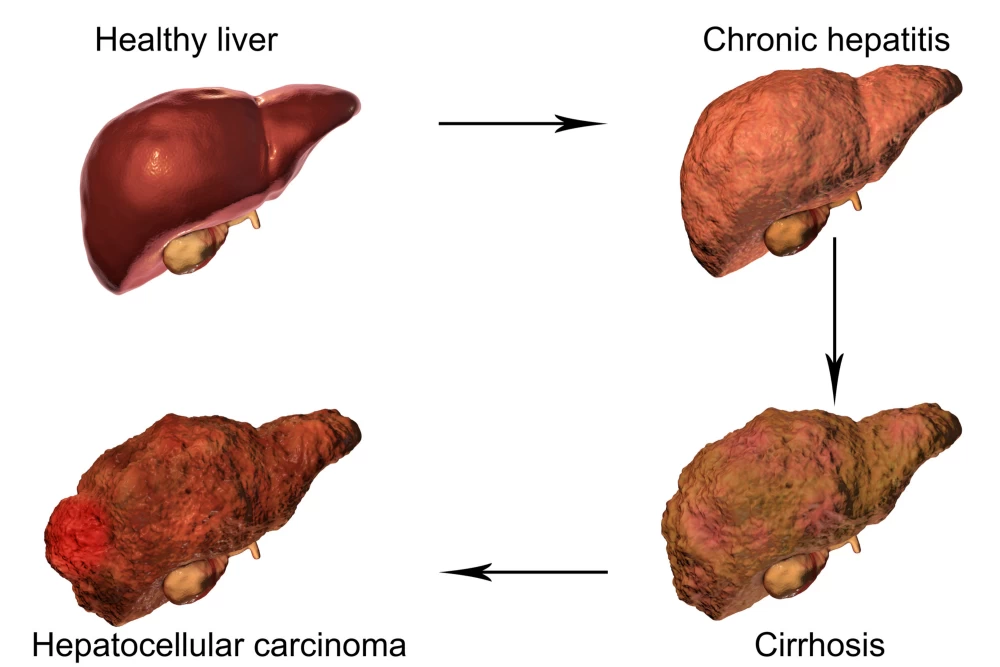
- 19th March 2023
Table of Contents
Fatty Liver
Fatty liver is a condition in which the liver stores excess fat, leading to inflammation and damage to the organ. While it can be caused by excessive alcohol consumption, non-alcoholic fatty liver disease (NAFLD) is becoming increasingly prevalent due to poor dietary habits and sedentary lifestyles. However, with the right diet changes, NAFLD can be reversed. The first step in reversing fatty liver through diet is reducing simple carbohydrates and increasing fiber intake. This means cutting out sugary drinks, refined grains like white bread and pasta, and processed foods high in added sugars. Instead, focus on whole grains like brown rice and quinoa, as well as vegetables and fruits rich in fiber. In addition to reducing carbs and increasing fiber intake, incorporating healthy fats into your diet can also help reverse fatty liver. Foods like avocados, nuts, seeds, olive oil, salmon or other fatty fish are all excellent sources of monounsaturated or polyunsaturated fats that have been shown to reduce inflammation in the body – including the liver – while promoting weight loss.
Causes of Fatty Liver
Fatty liver is a condition where excess fat accumulates in the liver cells. This can lead to inflammation and damage to the liver, potentially resulting in serious health problems such as liver failure or cirrhosis. There are several factors that can contribute to the development of fatty liver, including poor diet, obesity, type 2 diabetes, high cholesterol levels and excessive alcohol consumption. A poor diet that is high in processed foods and sugar can cause an accumulation of fat in the liver. Overconsumption of fructose found in sweetened beverages and processed foods has been linked to increased risk of developing fatty liver disease. Obesity also plays a significant role as it increases insulin resistance which leads to fat accumulation in the liver cells. Type 2 diabetes and high cholesterol levels are also associated with an increased risk of developing fatty liver disease. These conditions lead to an increase in triglycerides which are stored as fat within the liver cells. Alcohol consumption is another major contributor especially when consumed excessively over a prolonged period of time leading to alcoholic fatty liver disease. Making dietary changes that address these underlying causes can help reverse fatty liver disease over time. Having fatty liver can lead to serious health problems if left untreated. Fortunately, there are ways you can help reduce the effects of fatty liver in your body by making dietary changes. In this article, we will explore how to reverse fatty liver with diet and discuss the importance of a balanced diet in helping to improve your overall health. We will also look at specific foods that may aid in reversing fatty liver, as well as provide helpful tips for maintaining a healthy diet.
Benefits of a Healthy Diet
A healthy diet is vital in reversing the effects of fatty liver disease. A diet rich in whole foods, such as fruits, vegetables, and lean protein, can help reduce inflammation and improve liver function. These foods are also high in vitamins and minerals that support the immune system and promote overall health. Eating a balanced diet can also help with weight loss, which is important as excess body fat is one of the leading causes of fatty liver disease. Cutting out processed foods and sugar from diets can significantly decrease the likelihood of developing this condition. Additionally, limiting alcohol consumption is essential for those suffering from fatty liver disease. In conclusion, a healthy diet plays a crucial role in reversing fatty liver disease by promoting overall wellness and reducing inflammation. By adopting a balanced eating plan that includes nutrient-dense whole foods while avoiding processed items and sugar-laden drinks will go a long way to ensure proper management of this condition.
Foods to Avoid
Certain foods can be detrimental to your health, especially when it comes to fatty liver disease. Processed and fried foods are high in unhealthy fats which accumulate in the liver, leading to inflammation and damage. Avoiding these types of foods is crucial if you want to reverse your fatty liver disease. It's essential to avoid consuming sugary drinks and snacks such as sodas, cakes, cookies, and candy as well. Alcohol consumption also contributes significantly to fatty liver disease progression; it's important that you consider quitting alcohol altogether or limit its intake if you have been diagnosed with this condition. Red meat is another food that should be avoided because they are high in saturated fat and contribute to inflammation which worsens the condition of a fatty liver. In conclusion, avoiding processed foods, sugary snacks/drinks/alcohol consumption, and red meat is necessary for reversing fatty liver disease through diet. Instead of these unhealthy options opt for whole grains like brown rice or quinoa along with fruits and vegetables rich in nutrients. This approach will not only help improve your liver function but also benefit other aspects of your overall health.

Foods to Include
When it comes to reversing a fatty liver, the foods you eat are crucial. Including certain foods in your diet can help reduce inflammation and prevent further damage to your liver. One of these important food groups is plant-based proteins such as beans, lentils, and tofu. These foods are high in fiber and low in fat, making them an excellent choice for those with a fatty liver. Another food group that should be included in your diet is vegetables, particularly dark leafy greens like spinach and kale. These veggies are packed with vitamins and minerals that help support liver function and reduce inflammation. They also contain antioxidants which protect the liver from oxidative stress caused by toxins. Finally, healthy fats such as avocados, nuts, seeds, and olive oil should be included in moderation. These fats may actually help improve insulin resistance which can contribute to fatty liver disease. It's important to keep portions small however as too much fat can still contribute to weight gain which can exacerbate fatty liver disease symptoms.
Exercise for Reversing Fatty Liver
Exercise is an essential part of reversing fatty liver. It helps to burn excess calories and promote weight loss. Regular physical activity also increases insulin sensitivity, which is crucial for reducing the amount of fat stored in the liver. Studies have shown that exercise can improve liver enzymes in individuals with fatty liver disease. It is recommended to engage in at least 150 minutes of moderate-intensity exercise per week or 75 minutes of high-intensity exercise per week. Moderate intensity activities include brisk walking, cycling, swimming, and dancing while high-intensity exercises include running, HIIT workouts, and plyometric training. Weight training is also beneficial for building lean muscle mass and reducing fat accumulation in the liver. Resistance training has been shown to lower inflammation markers linked with fatty liver disease. However, it is important to consult a physician before starting any new exercise regimen especially if there are underlying health conditions present.
Consult a Doctor
Consulting a doctor is crucial when it comes to reversing fatty liver with diet. Your healthcare provider can help you understand the underlying causes of your condition and recommend appropriate dietary changes. They may also perform routine blood tests and imaging studies to monitor your progress. One of the key steps to reverse fatty liver is to reduce your intake of high-calorie, high-fat foods, such as processed snacks, fried foods, and sugary drinks. Your doctor may suggest increasing your intake of fruits, vegetables, whole grains, lean proteins like fish and chicken breast, and healthy fats like avocados and nuts. It’s important to consult with a doctor before making any significant dietary changes or starting a new exercise program. With proper medical guidance and lifestyle modifications, you can reverse fatty liver disease over time.
Conclusion
In conclusion, it is possible to reverse fatty liver with diet. A diet that is low in saturated fats and high in fiber can be helpful in reversing the condition. Additionally, reducing the consumption of processed foods and sugary drinks can also contribute to improved liver health. To reverse fatty liver with diet, it is important to focus on consuming whole foods such as fruits, vegetables, whole grains, lean proteins, and healthy fats. Foods that are rich in antioxidants such as berries and leafy greens can also help reduce inflammation in the liver. Lastly, it is important to note that sticking to a healthy diet alone may not always be enough to reverse fatty liver completely. Incorporating regular exercise into your routine along with other lifestyle changes such as reducing alcohol consumption and quitting smoking can also greatly benefit your liver health.














